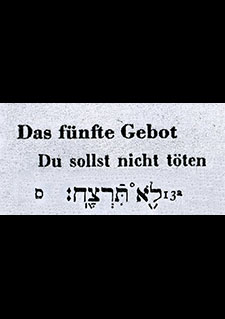Opposition from Church Groups
In 1943, two church groups formulated their theologically based opposition to the murder of Jews und the killing mentally ill and disabled people.
At Easter of 1943, two members of a circle gathered around the publisher Albert Lempp in Munich delivered the Letter from Munich Laity to Hans Meiser, Bishop of the Bavarian Regional Church.
It was intended to move the bishop to publicly protest the persecution of the Jews. The letter’s author, Hermann Diem, a Confessing Church pastor in Württemberg, argued that the church had to bear witness that the Jewish Question is primarily a Protestant and not a political issue. According to Scripture, the sole reason for the politically irregular existence and nature of the Jews was that this people of God are monopolized as an instrument of His revelation (Hermle/Thierfelder, Herausgefordert, 660). The church had to resist any anti-Semitism and, above all, any Christian anti-Semitism.
Bishop Meiser did not however consider himself to be in a position to take responsibility for a public protest from the church. He feared that his regional church would be put at a serious disadvantage. Meiser forwarded the text to Theophil Wurm, Bishop of the Württemberg Regional Church. Wurm did not remain idle and addressed Hitler directly in a powerful letter in July of 1943. His letter went unanswered.
The Confessing Church of the Evangelical Church of the Old Prussian Union met for its 12th confessional synod in October of 1943. It would be its last. In addition to resolutions against the continuing intimidation and leaders’ attempts to hinder the church in performing of its religious mission, the synod also adopted an exegesis of the fifth commandment. The synod’s consideration of this issue probably may also have been prompted in part by Kurt Gerstein, who had informed the Council of Brethren about the murder of Jews in the East in the summer of 1942.
In its resolution, the synod denounced the Nazis’ crimes with the following words: Extermination of human beings merely because they are a related to a criminal, are old or mentally ill or are members of another race is not wielding the sword that God has given to the authorities. For Christians, anyone in need is a neighbor, regardless of race, nationality or belief.
The resolution was not circulated any further, though. At best, this statement may have been read aloud from some pulpits on the German Day of Repentance and Prayer in 1943: Woe betide us and our nation, when life given by God is held in low esteem and a human being, created in God’s image, is valued only for his usefulness; when it is considered legitimate to kill human beings because they are considered unworthy of living or belong to another race, when hatred and ruthlessness spread. For God says: “Thou shalt not kill” (KJ 1933–1944, p. 387).

